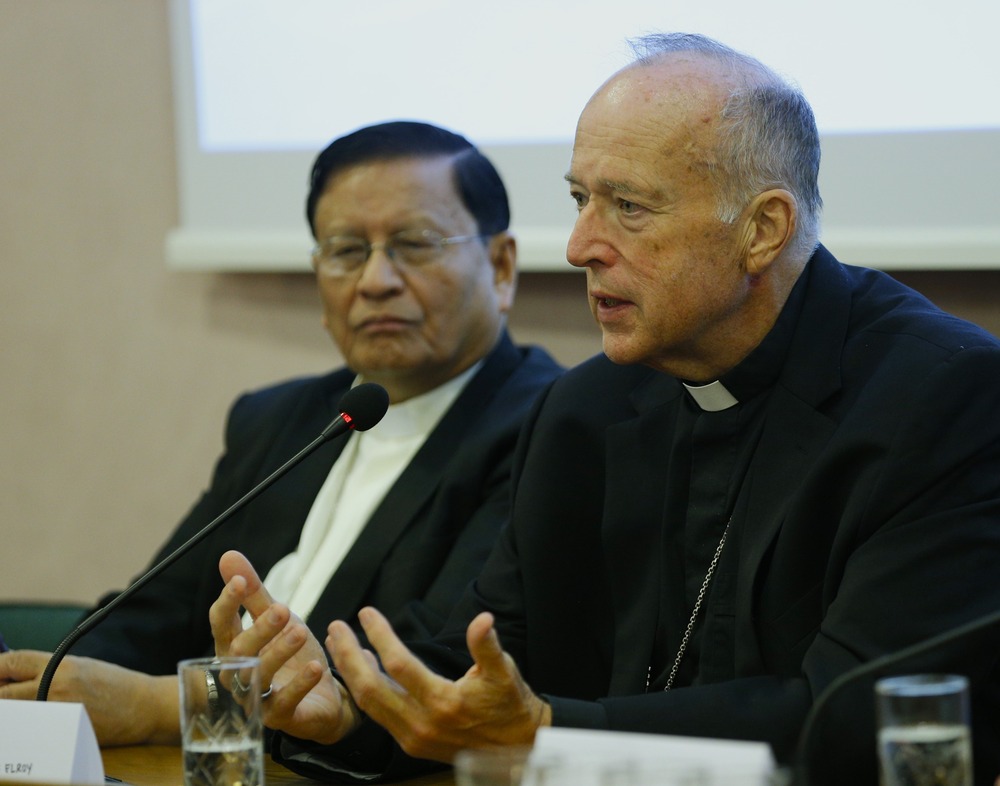
Cardinal Robert W. McElroy of San Diego speaks during an event to inaugurate the Catholic Institute for Nonviolence at the Istituto Maria Bambina in Rome Sept. 29, 2024. To the left is Cardinal Charles Bo of Yangon, Myanmar. (CNS/Justin McLellan)
The concept of just war, which has guided Catholic teaching on war and peace since the fourth century, has become "devalued as a moral instrument" due to its application in modern conflicts, said Cardinal Robert W. McElroy of San Diego.
Speaking Sept. 29 at the inauguration of the Catholic Institute for Nonviolence near the Vatican, the cardinal said that just war theory had become the "central prism" through which Catholic theology views the pursuit of justice. However, as practiced today, the principle's criteria for a "just war" often function as a checklist of conditions to be met for going to war "rather than as full-bodied moral restraints as they were envisioned," he said.
"I think we have to relativize just war theory, not toss it out entirely but give it a different position than it's had," McElroy said. "Part of just war theory is that (war) is a last resort. I wonder if we shouldn't have nonviolent action as a first resort, to plant it at the center" of Catholic teaching on conflict.
Just war theory can be traced back to St. Augustine, who argued that war can be morally waged under certain conditions in defense of justice. St. Thomas Aquinas further developed the theory, specifying conditions for a just war: fighting for a just cause, waged by a public authority and pursuing a good intention.
Pope Francis said in a 2022 interview that it is "time to rethink the concept of a 'just war.'"
Yet McElroy, an adviser to the new institute — part of Pax Christi International — told Catholic News Service that an emphasis on nonviolence "comes from the Gospel, so it's always been part of our doctrine."
"Just war theory was not part of the Gospel, it's an evolutionary Catholic practice or thought, and it's an important development in restraining warfare," he said. "It was not meant to be a justification of war but a restraint on war, and it has lost a lot of that capacity."
Advertisement
The cardinal said part of the institute's work will be to highlight the efficacy of active nonviolence in resolving conflict. Americans, he said, "would have to be convinced that active nonviolence can be effective."
Speaking with CNS, the cardinal said that ahead of the November general election, U.S. voters must become "more attuned to the enormity of American power militarily and in conflict situations, and to understand that it needs to be tempered by seeking just peace foremost."
Asked about Russia's war on Ukraine, McElroy said Ukraine has a right to defend itself against Russian aggression, calling it an "emergency situation."
"In my view, and in Catholic teaching, there are some cases of legitimate armed defense, but that must be pursued only after true nonviolent efforts," he told CNS.
Cardinal Charles Bo of Yangon, Myanmar, a country in a civil war since 2021, said that as conflicts increase worldwide — in his own country as well as in Israel, Palestine and Ukraine — "the time has come for us to embrace peace as the common religion of all humanity and to adopt nonviolence as our way of life."
Nonviolence, he said, "requires us to unlearn deeply ingrained beliefs — those destructive notions that violence is necessary or inevitable. We must strip away these falsehoods and instead learn and practice our true identity as nonviolent beings, made in the image of a loving and peaceful God."
The cardinal said that Gospel nonviolence is not merely an ideal "but a central teaching embedded in the Catechism of the Catholic Church" and one which offers "a moral principle and a practical ethic for transforming our fractured world."
"Peace and reconciliation are not simply ideals; they are the very roadmaps for our survival as a human species," he said.






